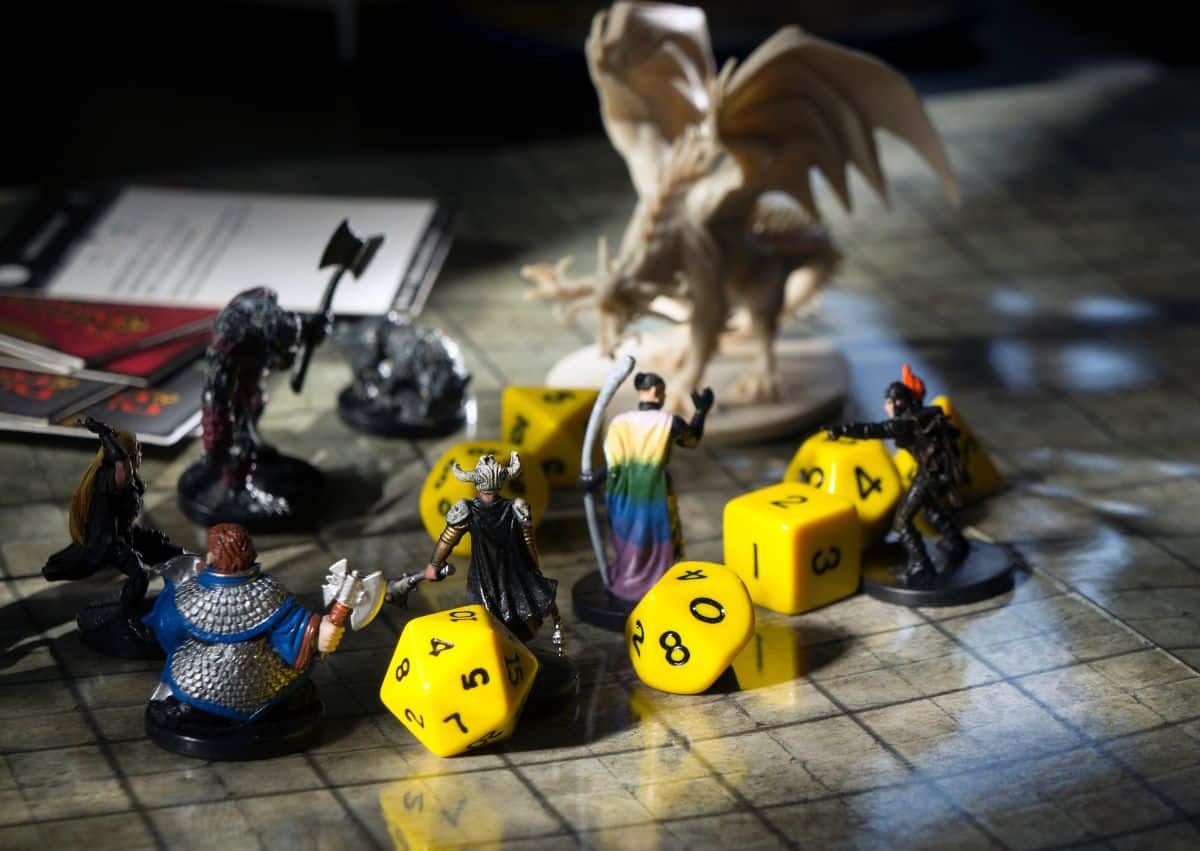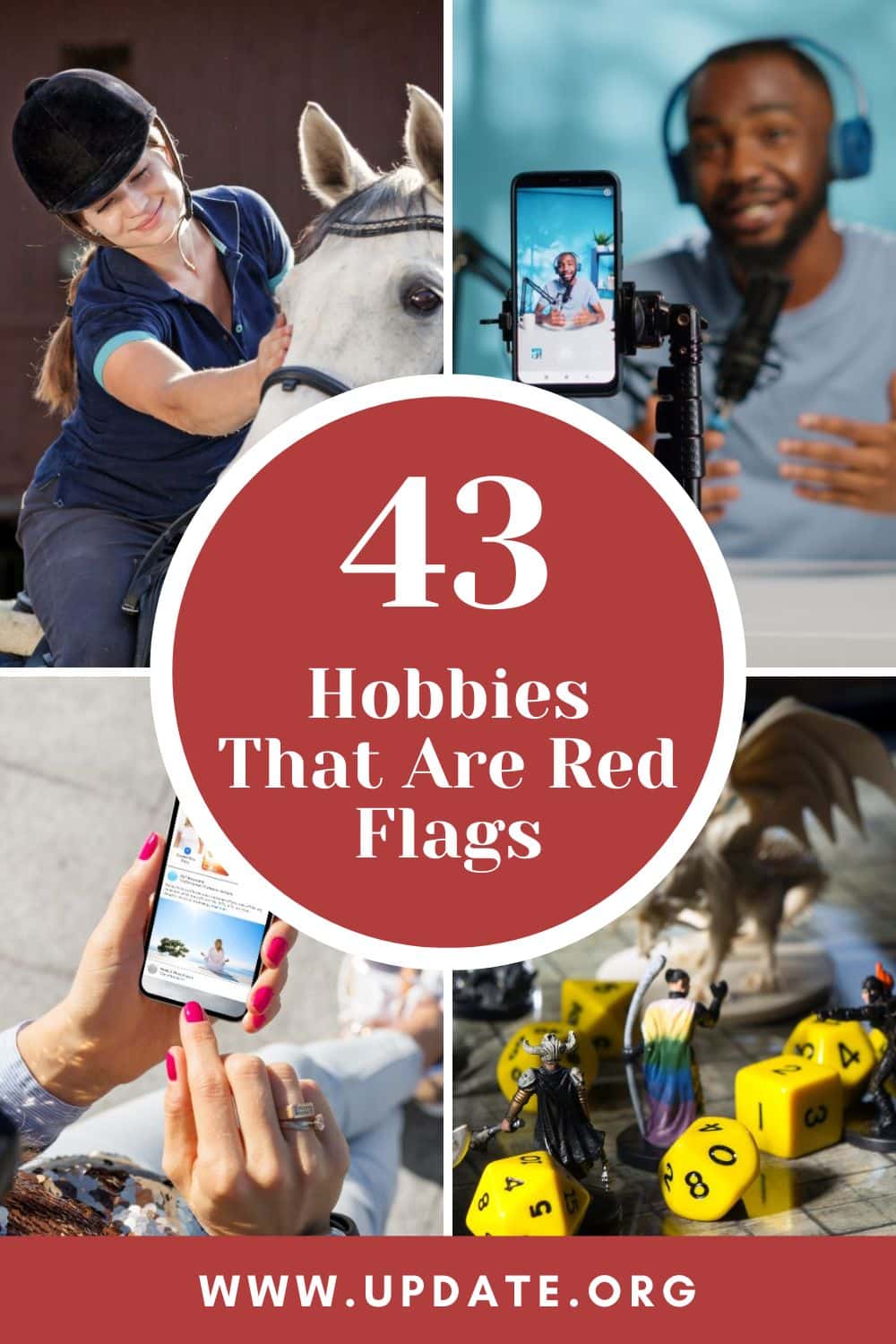Hobbies are more than just leisure activities; they can be telling indicators of our deeper selves. While most are harmless, some hobbies raise red flags, hinting at underlying issues that could impact personal and social dynamics. Recognizing these signs is crucial for understanding the subtle complexities behind our choices and behaviors.

In exploring these hobbies, we gain insights into how seemingly benign interests can reflect significant aspects of personality and lifestyle. It's a delicate balance between harmless passion and potential warning signals.
Jump to:
- 1. Excessive Social Media Posting
- 2. Malicious Driving
- 3. Watching Animal Fights
- 4. Creating Fake Social Media Content
- 5. Cyberstalking and Messaging Strangers
- 6. Admiration for Hitler
- 7. Over-adopting Pets or Children
- 8. Excessive Gambling
- 9. Pressuring Hobbies into Profit
- 10. Spontaneous Dungeons and Dragons Games
- 11. Participating in Beauty Pageants
- 12. Family Vlogging
- 13. Collecting Blood Slides
- 14. Crushing Cans
- 15. Punching Walls
- 16. Social Media Preoccupation
- 17. Cutting Out Magazine Images
- 18. Casual Talk of Harming Animals
- 19. Obsession with Philosophy
- 20. Social Media Influencing
- 21. Running an MLM or Local Area Facebook Group
- 22. Sunning One's Perineum
- 23. Creating See-Through Lego
- 24. Playing Magic: The Gathering
- 25. Horse Girl Culture
- 26. Online Arguing for Entertainment
- 27. Substance-focused Identity
- 28. Pickling of Animal Organs
- 29. Hyperpartisan Media Consumption
- 30. Sharing Gore Videos
- 31. Parents Forcing Children into Pageantry
- 32. Extravagant Collecting Beyond Means
- 33. Collecting Sexual Anime Figurines
- 34. Collecting Preserved Human Specimens
- 35. Disney-Centric Identity
- 36. HOA President
- 37. Astrology Dependence
- 38. Collecting Animal Bones and Human Teeth
- 39. Lack Of Hobbies
- 40. Consuming Alpha-Male Content
- 41. Neighborhood 'Cats Watch' Group
- 42. Gun Enthusiast Extremes
- 43. Excessive Video Gaming
1. Excessive Social Media Posting

When social media becomes an obsession, it reflects a deep need for external validation. Constantly seeking likes and comments, this behavior can indicate underlying insecurity. Such a relentless pursuit of digital approval often leads to negative impacts on real-world relationships and mental well-being.
University of Pennsylvania research links excessive social media use to declines in happiness. Ironically, reducing digital interactions can significantly enhance one's real-life connections, reminding us of the value of genuine offline relationships.
2. Malicious Driving
Taking pleasure in splashing pedestrians while driving reflects a concerning lack of empathy. This hobby, far from harmless fun, reveals a disturbing enjoyment of others' discomfort. It's a red flag, indicative of a personality that finds amusement in causing distress, pointing to deeper antisocial tendencies.
Such actions, though seemingly trivial, highlight a disregard for basic respect and consideration for others. It's a behavior that goes against social norms, signaling the potential for more serious issues in interpersonal conduct.
3. Watching Animal Fights
An interest in animal fights signals a troubling desensitization to violence, hinting at deeper character issues. This hobby, rooted in historical entertainment, now raises serious ethical concerns. It suggests an unsettling enjoyment of conflict and cruelty. Acknowledging the implications of this hobby is vital, as it not only perpetuates animal suffering but also reflects on our empathy and moral judgment.
4. Creating Fake Social Media Content
Fabricating content for social media fame and profit showcases a worrying lack of authenticity. This deliberate act of deception, driven by a desire for popularity, erodes trust and misleads audiences. It's a deceptive practice that reflects a moral dilemma in our digital age.
The rise of influencer fraud underscores a larger issue of dishonesty in digital interactions. As we navigate the online world, it's a reminder to seek and value authenticity over curated illusions.
5. Cyberstalking and Messaging Strangers

Cyberstalking and unsolicited messaging of strangers signal a disregard for boundaries and privacy. Often hidden behind a screen, this behavior can be intrusive and unsettling, reflecting an unhealthy obsession with others. It can evolve from curiosity to harassment, crossing ethical and legal lines. This digital overreach underlines the importance of respecting online boundaries. It's a reminder of the need for responsible and respectful digital communication, maintaining the delicate balance between connectivity and privacy.
6. Admiration for Hitler
Admiration for Hitler is a disturbing interest that often aligns with extremist ideologies. This fascination, typically associated with admiration for totalitarianism and anti-Semitic views, can be a warning sign of radical and dangerous beliefs. It raises serious ethical and moral concerns.
Such admiration highlights the need for vigilance against the glorification of oppressive historical figures. Remembering the importance of learning from history to foster a more compassionate and informed society is crucial.
7. Over-adopting Pets or Children
Over-adopting pets or children, especially when resources are limited, suggests a misguided desire to help that can lead to inadequate care. While the intention may be compassionate, it often results in overwhelmed caregivers and dependents needing more proper attention. This behavior can stem from a need to feel needed or a savior complex.
The desire to adopt must be balanced with the ability to provide. It's a reminder to consider the practical implications of caregiving, ensuring the well-being of all involved.
8. Excessive Gambling
Excessive gambling is a red flag, often indicative of an addictive behavior that can lead to financial ruin and strained relationships. The relentless pursuit of winning, despite consistent losses, highlights a destructive cycle that can consume an individual's life. This habit poses significant risks to both financial stability and mental health. It's a reminder of the importance of moderation and the need to seek help if gambling becomes a compulsive and detrimental activity.
9. Pressuring Hobbies into Profit
Turning hobbies into profit-driven ventures, while entrepreneurial, can strip away the intrinsic joy and relaxation they offer. This shift from passion to profit can lead to burnout and a loss of the hobby's original appeal, reflecting our society's emphasis on productivity and financial gain.
The trend of monetizing hobbies highlights the value of maintaining activities purely for enjoyment. It's a reminder to cherish the personal satisfaction and creative expression they provide, separate from monetary incentives.
10. Spontaneous Dungeons and Dragons Games

Spontaneous Dungeons and Dragons games showcase creativity and improvisation, offering an escape into fantasy and shared storytelling. This hobby fosters social connections and imaginative play, highlighting the timeless appeal of collaborative gaming experiences.
These impromptu sessions illustrate the joy of unplanned adventures and the bond they create among players. It's a testament to the enduring charm of role-playing games and their ability to bring people together in shared creativity.
11. Participating in Beauty Pageants
Participation in beauty pageants, especially at a young age, can emphasize physical appearance over inner qualities. This focus might lead to issues like low self-esteem and unrealistic body standards, reflecting societal pressures on beauty and perfection.
The world of pageants reminds us of the need for a balanced approach to competition, prioritizing self-worth and diverse talents over mere physical attractiveness. It’s a call for redefining beauty norms and encouraging holistic development.
12. Family Vlogging
Family vlogging, while creating opportunities for connection and income, can also exploit children's privacy. This blurring of personal and public life, often without the child's consent, raises ethical concerns about digital exposure and autonomy. The balance between family storytelling and exploitation becomes a contentious issue.
Family vlogging's impact on children's future identity is a critical concern in our digital era. It serves as a call for responsible content creation, ensuring respect for the rights and privacy of younger family members.
13. Collecting Blood Slides
The collection of blood slides, though linked to professional work for some, can evoke discomfort due to its association with the macabre. It transcends typical hobbies, delving into the realms of medical curiosity and potentially morbid fascination, raising eyebrows about the collector's motivations.
As this hobby strays from mainstream interests, it challenges societal norms and personal comfort zones. It's a stark reminder of how diverse and individualistic human interests can be despite their unconventional nature.
14. Crushing Cans
Crushing cans has evolved from a show of physical strength to a symbolic act reflecting cultural shifts. Rooted in history, this gesture transcends the mere disposal of a drink container, becoming a statement about changing perceptions of masculinity and societal norms.
This act, simple yet laden with historical context, prompts reflection on the evolving definitions of strength and masculinity. It's a window into how cultural symbols can adapt and persist over time.
15. Punching Walls

Punching walls, often driven by unchecked anger, goes beyond physical damage; it can indicate deeper emotional struggles. This manifestation of aggression is a concerning sign, pointing towards potential issues in anger management and interpersonal relationships.
As this behavior reflects a lack of constructive emotional outlets, it becomes a call to action for seeking healthier ways to express and manage strong feelings. It's a stark reminder of the importance of emotional self-regulation.
16. Social Media Preoccupation
Intense preoccupation with social media can overshadow the richness of real-life experiences, leading to a disconnect from immediate surroundings. This digital obsession often interferes with personal interactions, creating challenges in balancing online and offline lives.
As social media continues to shape our daily lives, finding harmony between virtual engagement and present moments becomes crucial. It’s a modern conundrum, calling for mindful usage of digital platforms to enhance rather than detract from life's real connections.
17. Cutting Out Magazine Images
Cutting eyes out of magazine images, often driven by jealousy, reflects deep emotional complexities. This unusual habit goes beyond crafting or collecting; it reveals personal insecurities and controlling tendencies, impacting relationships. This behavior, while unique, underscores the influence of personal insecurities on our actions. It’s a reminder to confront and address underlying emotional issues for healthier, more trusting relationships.
18. Casual Talk of Harming Animals
Casual discussions about harming animals are alarming and often indicative of a desensitization to violence. This behavior is not only concerning for animal welfare but also raises red flags about potential harm to humans. It’s a significant indicator that requires attention and intervention.
Understanding the link between animal cruelty and broader violent tendencies is crucial. Such discussions are not mere eccentricities; they're warning signs of deeper issues that need addressing to prevent escalation into more serious forms of violence.
19. Obsession with Philosophy
An intense preoccupation with philosophy can be enriching or concerning, depending on the content and context. Philosophy, at its best, fosters critical thinking and deep exploration of life's questions. However, an excessive focus can also lead to frustration and alienation.
The philosopher-reader's journey is complex, oscillating between enlightenment and existential angst. This pursuit, while intellectually stimulating, can also be isolating, underlining the delicate balance between seeking knowledge and maintaining well-rounded, grounded perspectives on life.
20. Social Media Influencing

Social media influencing, while offering a platform for creativity and connection, can blur the line between authentic expression and commercial interests. This pursuit often leads to a focus on external validation and a distorted self-image, reflecting the powerful impact of digital platforms on personal identity.
The role of influencers underscores the complexities of online persona management. It’s a reminder of the importance of authenticity and ethical considerations in the rapidly evolving landscape of social media.
21. Running an MLM or Local Area Facebook Group
Running an MLM or being an admin of a local area Facebook group can quickly turn from community building to an exercise in power dynamics. Some admins exert undue authority, creating an environment of control rather than open dialogue. This shift from leadership to dictatorship can be subtle yet significant.
The role of an admin or MLM leader should be rooted in fairness and transparency. The tendency towards autocratic control serves as a reminder of the importance of ethical leadership and respect for community voices in digital spaces.
22. Sunning One's Perineum
The trend of sunning one's perineum, despite lacking scientific backing, has garnered attention for its purported health and energy benefits. Advocates of this practice claim it boosts vitality and mental well-being, yet medical experts warn against potential risks. It's a practice rooted more in personal belief than empirical evidence.
This unusual activity underscores the ongoing search for unconventional wellness methods. It highlights the fine line between exploring alternative health practices and adhering to scientifically proven advice, reminding us of the importance of informed choices in personal health pursuits.
23. Creating See-Through Lego
Creating see-through Lego figures, especially with unconventional contents, can be seen as an artistic expression but also may be perceived as disturbing by some. This hobby walks a fine line between creativity and controversy, reflecting a unique blend of playfulness and boundary-pushing.
The hobby challenges conventional notions of art and creativity, highlighting the diverse ways people express themselves. It's a reminder of the subjective nature of art and the varied reactions it can evoke.
24. Playing Magic: The Gathering
Magic The Gathering captivates with its strategic depth yet sometimes fosters a competitive, exclusive atmosphere. New players might encounter unsportsmanlike conduct, which can be off-putting. If you're stepping into this world, be prepared for both intellectual challenges and the potential for confrontational dynamics. This game's community mirrors broader social behaviors, where competitive spirit can overshadow camaraderie and fair play, marking a red flag for those seeking a more inclusive experience.
25. Horse Girl Culture

Horse girls, often stereotyped, are defined by their deep passion for equestrian life. This intense hobby shapes their identity, sometimes leading to social isolation or judgment. While the devotion is admirable, it can overshadow other facets of personality, limiting broader social interactions. When you encounter a horse girl, it's a moment to reflect on how intense hobbies can define us but also narrow our worldviews and social circles.
26. Online Arguing for Entertainment
Engaging in online arguments for mere entertainment reflects a misuse of digital communication platforms. This behavior, often marked by taunting and provocation, detracts from the potential for meaningful dialogue. It's a digital manifestation of boredom, channeling energy into unproductive and sometimes harmful interactions.
This tendency to argue online without purpose signals a red flag in social behavior, highlighting a disregard for constructive communication. It's a reminder of the value of empathy and purposeful discourse in our increasingly connected world.
27. Substance-focused Identity
Defining one's personality by substances like alcohol or drugs points to a potentially concerning lifestyle. This identification often masks deeper issues, substituting genuine personality traits with a reliance on substances. It's a signal of potential dependency or a lack of more substantive qualities. This focus on substances as a key trait is a red flag for underlying issues, necessitating a closer look at one's coping mechanisms and personal development. It emphasizes the importance of well-rounded character traits beyond substance use.
28. Pickling of Animal Organs
Amateur taxidermy, particularly in unconventional forms like organ pickling, occupies a unique niche. This hobby merges artistic expression with an unusual fascination for preservation, appealing to a specific market. It straddles the line between creativity and the macabre, evoking mixed reactions. This hobby's distinctiveness raises questions about artistic boundaries and ethical considerations. It invites dialogue about personal creativity and its expression, highlighting the diversity of human interests and the various forms they take.
29. Hyperpartisan Media Consumption
Consuming hyperpartisan media and echoing its extreme views can lead to a narrowed worldview. This habitual engagement often solidifies polarized political beliefs, reducing the capacity for balanced understanding and open-minded discussion.
The allure of hyperpartisan content reflects our inclination toward confirmation bias. Recognizing its impact on our perceptions is essential, as well as advocating for a more critical and diverse consumption of information to foster a more well-rounded understanding of the world.
30. Sharing Gore Videos

The hobby of watching and sharing gore videos, often justified as desensitization, can mask deeper psychological issues. This fascination with violent content not only reflects a troubling desensitization to human suffering but also risks normalizing extreme violence.
Such interests challenge us to examine the boundaries of our curiosity and the ethical implications of our digital footprints. It’s a call to be mindful of the content we consume and share, considering its impact on our mental health and societal norms.
31. Parents Forcing Children into Pageantry
Parents pushing children into pageants often reflect their own unfulfilled aspirations rather than the child’s interests. This practice can negatively impact the child's self-esteem and personal development, overshadowing childhood innocence with the pursuit of superficial accolades. It's a sign of vicarious living through children, raising concerns about healthy parenting. This involvement in child pageantry is a red flag for the balance in parent-child dynamics, emphasizing the importance of nurturing genuine interests over projecting adult aspirations onto young lives.
32. Extravagant Collecting Beyond Means
Collecting luxury items beyond one's financial means suggests a struggle with materialism and societal pressures. This pursuit can lead to financial distress and personal anxiety, highlighting a disconnect between desires and reality. It's a sign of overreaching aspirations, potentially masking deeper insecurities or a lack of contentment.
Engaging in such collecting is a red flag for financial prudence and self-awareness. It reminds us of the importance of aligning hobbies and interests with one's actual lifestyle and values.
33. Collecting Sexual Anime Figurines
Collecting sexualized anime figurines, especially when prominently displayed, can raise questions about social awareness and appropriateness. This hobby, while a form of self-expression, can be viewed as crossing boundaries of conventional taste and comfort, particularly in shared or public spaces.
Reflecting on this interest highlights the intersection of personal hobbies and social norms. It’s a reminder of how our personal interests align with, or diverge from, broader societal expectations and cultural sensitivities.
34. Collecting Preserved Human Specimens
The collection of preserved human anatomical specimens, though historically significant, often veers into the macabre. This hobby, blending medical interest with an affinity for the past, may unsettle those unfamiliar with its academic roots. Collectors view it as preserving history, while others see a concerning fascination with mortality.
For many, this hobby raises ethical and moral questions, challenging norms about respect for the deceased. It’s a stark reminder of the diverse, sometimes controversial, ways people engage with history and human biology.
35. Disney-Centric Identity

An identity centered around Disney, though seemingly innocent, suggests an escapist retreat into a fantastical world. This fixation can result in idealized expectations of life, potentially overlooking the complexities of adulthood. Disney's influence on identity formation is profound, shaping perceptions and values from a young age.
While enchanting, this Disney-focused worldview invites a balance between fantasy and reality, ensuring that magical thinking does not eclipse personal growth or engagement with the real world.
36. HOA President
Serving as an HOA president can indicate a commitment to a community organization, but it may also hint at a desire for control and uniformity. The role involves navigating the delicate balance between community well-being and individual freedoms, sometimes leading to power dynamics that favor conformity over diversity. This leadership position in a homeowners' association can become a red flag when it veers toward autocracy. It's a reminder of the importance of equitable governance and respecting the diversity within communities.
37. Astrology Dependence
An overreliance on astrology for personal decisions, like basing relationships on star signs, can indicate a simplistic approach to understanding human behavior. While astrology provides comfort and a semblance of order, its deterministic nature can lead to superficial judgments and missed connections. This reliance on astrology underscores a quest for control in an unpredictable world. It's an invitation to embrace complexity and unpredictability in human relationships rather than seeking oversimplified explanations.
38. Collecting Animal Bones and Human Teeth
Collecting animal bones and human teeth, particularly without an appreciation for living creatures, hints at an unusual preoccupation with death. This interest often straddles the line between scientific curiosity and darker fascinations, raising questions about one's emotional connection to life and death. This collection, while unique, challenges societal norms and personal comfort levels. It's a reminder of the varied expressions of human interest and the ethical considerations they invoke.
39. Lack Of Hobbies
The absence of hobbies can be a red flag, indicating a lack of personal engagement and exploration. Without interests or pastimes, individuals may struggle to find fulfillment outside of work, leading to a one-dimensional life experience. This absence highlights the importance of hobbies for personal growth and mental well-being. It's a call to discover passions that enrich life, providing balance and a sense of achievement beyond professional accomplishments.
40. Consuming Alpha-Male Content

Constant consumption of alpha-male content can indicate an adherence to toxic masculinity and narrow gender norms. This mindset often glorifies dominance and aggression, potentially shaping harmful attitudes toward interpersonal dynamics and societal roles. This focus on alpha-male ideals highlights the need for a broader, more empathetic view of masculinity. It's a call to embrace diverse expressions of strength and leadership, fostering healthier models of manhood.
41. Neighborhood 'Cats Watch' Group
Participating in a neighborhood 'cats watch' group with overzealous fervor can indicate a need for control and intrusion into others' lives. While the intention might be animal welfare, the actions can become disruptive and invasive, affecting both pets and their owners. This intense involvement in pet monitoring challenges the boundaries of community care. It's a reminder of the importance of respecting personal space and privacy, balancing concern for animals with consideration for their owners' rights.
42. Gun Enthusiast Extremes
While many gun enthusiasts engage responsibly, an extreme obsession with firearms can be a red flag. It sometimes attracts individuals with problematic views, potentially leading to unhealthy power dynamics or a glorification of violence.
Responsible gun ownership is crucial, but an excessive fixation on firearms raises concerns about attitudes toward conflict and security. It's a call for balance and respect for safety, ensuring that interest in guns aligns with a responsible and community-minded approach.
43. Excessive Video Gaming
An excessive emotional reaction to video games, especially anger or frustration, can be a red flag for poor impulse control. This behavior often reveals an inability to manage emotions healthily, potentially leading to destructive actions and strained relationships.
The intensity of these reactions in gaming calls for self-awareness and emotional regulation. It's a reminder of the importance of balancing passion with composure, ensuring that our hobbies contribute positively to our mental and emotional well-being.





